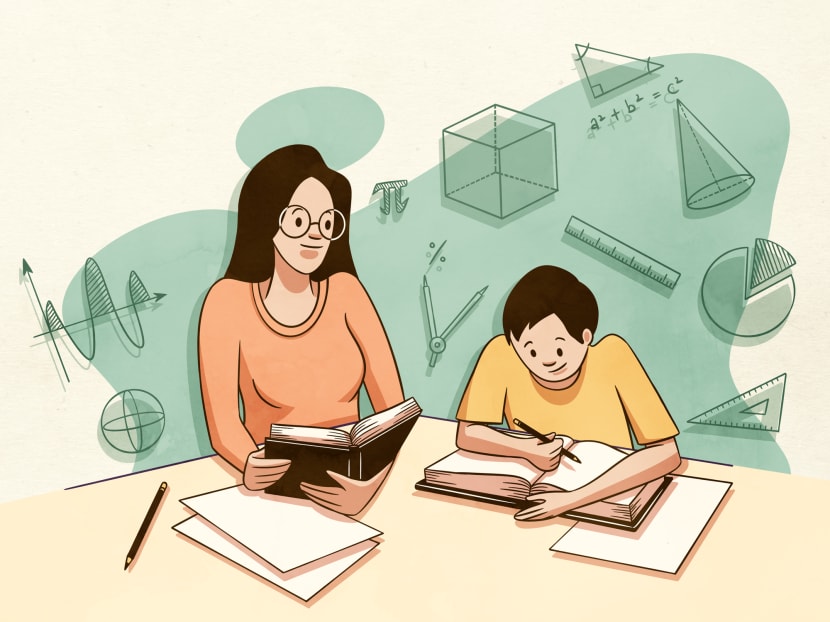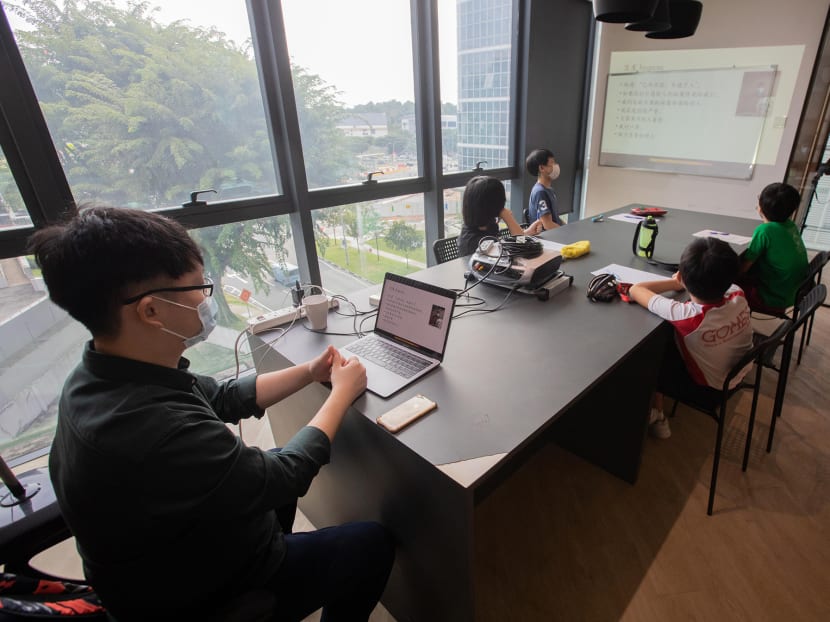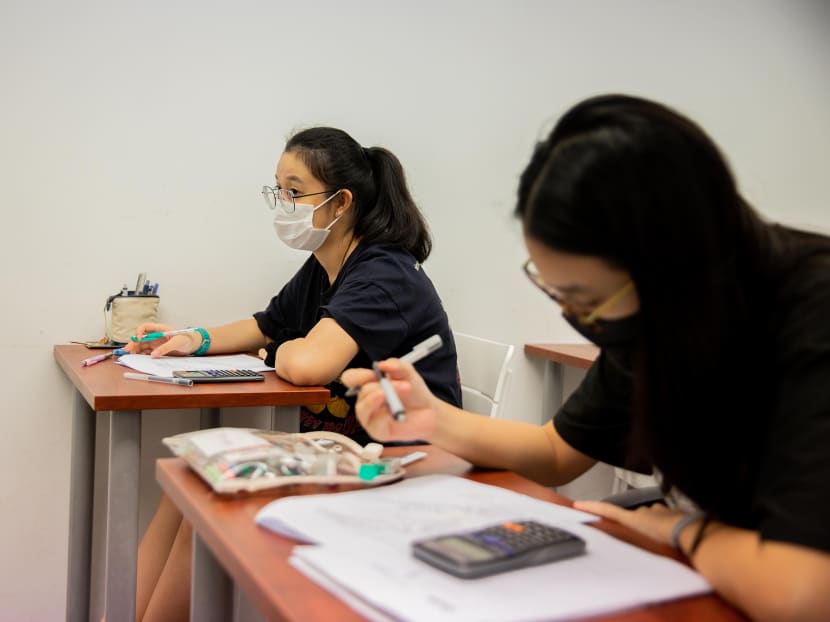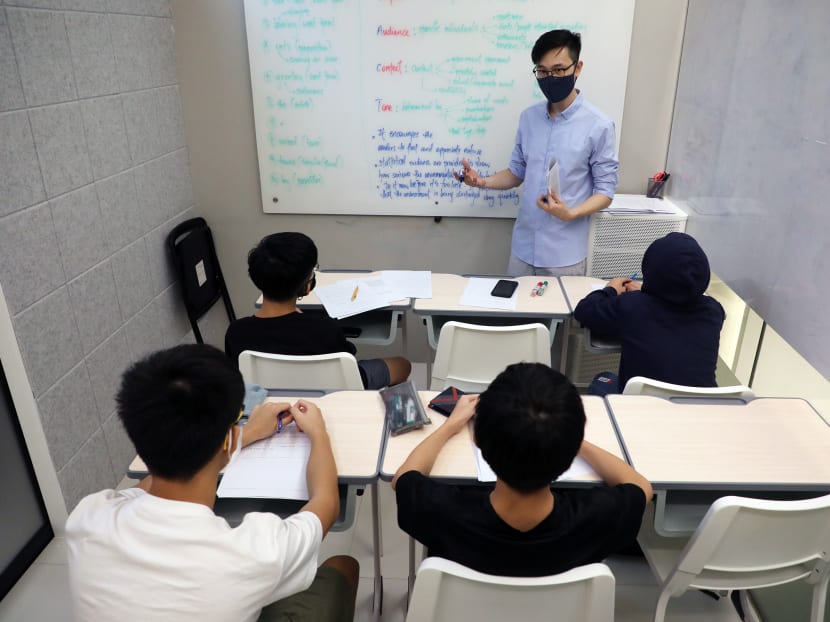The Big Read in short: Tuition craze amid the pandemic
Each week, TODAY's long-running Big Read series delves into the trends and issues that matter. This week, we look at how the Covid-19 pandemic has fuelled even greater demand for the billion-dollar tuition industry. This is a shortened version of the full feature.

Even as teachers are now required to seek approval to give tuition outside of school, following a review of guidelines by the Public Service Division, the pandemic has not only prompted some parents in Singapore to reconsider their stance on tuition, it also seems to have made tuition as indispensable as ever.
Each week, TODAY's long-running Big Read series delves into the trends and issues that matter. This week, we look at how the Covid-19 pandemic has fuelled even greater demand for the billion-dollar tuition industry. This is a shortened version of the full feature, which can be found here.
- A perennial debate over the pros and cons of private tuition has resurfaced following China’s drastic move recently to ban tutoring for profit
- In Singapore, teachers are now required to seek approval to give tuition outside of school, following a review of guidelines by the Public Service Division
- Meanwhile, enrolment at some tuition centres has gone up over the past 18 months, amid the Covid-19 pandemic
- The centres attribute the spike to the implementation of home-based learning — particularly in the initial stages when schools and teachers were still new to it
- Costs have to be regulated for tuition to play a complementary role in the Singapore education system, an industry player suggests
SINGAPORE — Housewife Santi Choo’s two children briefly had Chinese tuition but by and large, she never believed in sending them for private tuition — not even when her older daughter sat for the Primary School Leaving Examination (PSLE) some years ago.
Covid-19, however, changed all that.
Despite the pandemic causing her husband to lose his job as a project manager in the middle of last year, they decided to spend about S$700 a month from January to hire two home tutors for their younger son, who is taking the PSLE this year, after seeing his maths and science grades plummet last year.
Mrs Choo, 46, blamed her son’s poor performance partly on home-based learning (HBL), which was first introduced when Singapore entered a two-month circuit breaker in April last year amid a sharp spike in Covid-19 cases.
“He thought of it as holidaying at home and took schooling too lightly,” she said.
She was further compelled to seek tuition for the 12-year-old boy after finding it increasingly hard to reach his school teachers.
“Normally, within a day or the following day, the teachers will reply, but nowadays, the replies are a bit slow,” she added.
With her 16-year-old daughter also requesting to have maths tuition, the family’s expenditure on tuition goes up to S$1,500 a month.
This is by no means a small sum for Mrs Choo, who is working part-time at a food stall, while her husband does a mix of odd and contract jobs while searching for permanent work.
Despite their initial lukewarm attitude towards tuition, they believe that it is necessary now as their children just need “some pushing” to excel.
Even as teachers are now required to seek approval to give tuition outside of school, following a review of guidelines by the Public Service Division, the pandemic has not only prompted some parents in Singapore such as Mrs Choo to reconsider their stance on tuition, it also seems to have made tuition as indispensable as ever.
Meanwhile, some tuition centres had moved even faster than the schools in coming up with innovative platforms to adapt to the disruptions to school-based learning.
For instance, at SLC School of Language and Communication, the centre which specialises in English and Chinese tuition wasted no time in offering auxiliary “top-up classes” for students who might require additional support on specific areas such as oral or comprehension over teleconferencing app Zoom.
As a result, student enrolment over the past 18 months had grown by 50 per cent, with principal Ben Lee attributing it to the implementation of HBL — particularly in the initial stages when schools and teachers were still new to it.

Between March last year and now, some 15 per cent more students had enrolled with Making Sense, a chemistry and science tuition centre, as it fills the need to “support and hand-hold” pupils who have found it difficult adjusting to online or self-directed learning, said its managing director William Lin.
Dr Gavin Ng, director of Gavin’s Tuition, said enrolment at his centre, which mostly operates over online platforms now following the closure of two of his five outlets, went up from around 450 students to 600.
BILLION-DOLLAR INDUSTRY THAT’S STILL GROWING
The neverending debate over the pros and cons of private tuition has resurfaced following China’s drastic move recently to ban tutoring for profit in core school subjects, as well as foreign investment in the sector, in an attempt to make raising children and education more affordable for parents. The high cost of raising a child in China has contributed to its low birth rates.
The harsh curbs — which threaten to decimate China’s US$100 billion (S$136 billion) private tutoring and online education sector — have led some parents and educators here to question whether Singapore, too, should do more to rein in its own “shadow education industry”. The sector here was worth S$1.4 billion, according to the last Household Expenditure Survey in 2017 and 2018.
Back in 2018, then Education Minister Ong Ye Kung had said the Government had no intention of banning tuition even as he announced a slew of major changes to reduce emphasis on academic grades, such as scrapping mid-year examinations at some levels in both primary and secondary schools.
A ban on tuition would be akin to just treating the symptoms of a rigorous education system, Mr Ong said.
Meanwhile, the tuition industry itself has evolved to keep abreast of the education landscape’s changing needs and demands, education experts and industry players told TODAY.
They added that the sector is now dominated by tutoring chains with deep pockets, which are well-equipped to follow the Ministry of Education’s (MOE) mandate to help students “discover the joy of learning” and give their own spin to it.
Take the example of The Learning Lab, which American private equity firm Advent International reportedly bought a significant stake in for around S$300 million in 2014.
The centre was known for its emphasis on getting students into MOE’s Gifted Education Programme (GEP), meant for the intellectually-gifted, and Integrated Programmes (IP), a six-year programme targeted at the top 10 per cent of PSLE students.
In the past five years, the 20-year-old centre has put in place a teaching and learning framework that emphasises “a holistic approach to education, balancing knowledge, skills, and dispositions”, said The Learning Lab’s director of curriculum, Dr Lubna Alsagoff, a former National Institute of Education (NIE) associate professor.
But such tuition courses don’t come cheap.
Today, the monthly regular fees for one subject at The Learning Lab start from S$410 for Primary One to Four students, and S$432 for those in Primary Five or Six — up from S$390 and S$400 respectively in 2018. Group tuition typically costs S$30 per hour at the primary level.
REINING IN THE MONSTER
Apart from discussing whether private tuition is a boon or bane for students and their parents, the debate also involves a broader discourse on issues such as inequality, privilege, meritocracy and competition.
The problem is that the industry has become overly segmented with unequal access, said Mr Victor Pok, who runs KidsExcel, a social enterprise for the underprivileged, and Pal Learning, a commercially-run tuition centre for the middle-income segment.
For tuition to play a complementary role in the Singapore education system, costs have to be regulated, so that opportunities can be equalised and market failure managed, said the former physical education and English school teacher.
“Classes for GEP preparation and DSA have gotten out of control and it is impossible to stop as long as parents can afford it,” he said.
The myriad of offerings by tuition centres to help students in just about any area where demand for it exists — so long as they can afford it — has also created excessive reliance on tuition, along with its implications.
Mr Ong touched on this when he addressed the tuition issue in Parliament in 2019, in response to queries from Members of Parliament following the release of the Household Expenditure Survey that year.
Stating that tuition “may not be necessary and can even be detrimental” if a child is generally coping well academically and understands the fundamentals, Mr Ong said: “Excessive reliance on tuition can diminish the ability for independent learning, deprive students of opportunities to develop self-management skills and promote unhealthy competition.”
REDUCING THE TUITION ADDICTION
One of the first steps towards reducing the reliance on tuition is to address society’s excessive focus on academic grades, Mr Ong noted in his parliamentary response.
He then highlighted that MOE had introduced several policy changes under its “Learn for Life” movement in a bid to strike a balance. They included expanding the number of DSA places in schools, reducing school-based assessments, changes to the PSLE scoring system this year, and the rollout of full subject-based banding in all secondary schools by 2024.
Despite such changes to the educational system, the demand for private tuition here doesn’t seem to be waning. Why?
“It is in our DNA. Not just Singapore, but Asians in Australia, USA, UK, Canada are also anxious. They are the ones who will still send their children to enrichment classes,” Ms Liu said.

In a response to TODAY’s queries, an MOE spokesperson said that the reforms are part of its efforts to raise the school education system to a new level “over the next five to 10 years”.
“These efforts will take time to bear fruit, even as changing mindsets take time,” the spokesperson added.
Two teachers, who spoke to TODAY on the condition of anonymity as they were not supposed to speak to the media, continued to highlight the problem of teachers being overburdened with duties other than teaching, such as in event planning.
For example, as Covid-19 had put a stop to mass assemblies, teachers would have to leverage on their own skills or learn from scratch how to pre-record or stream performances and show them over Zoom on occasions like Racial Harmony Day or Chinese New Year.
Said a 31-year-old Chinese teacher at a Secondary School: “These are not skills that a layman would have… We need more help here, and these shouldn’t rest on our shoulders. We are not supposed to be professional entertainers.”
She added that the workload would never be even under such circumstances as the teachers who are more skilled would always be tapped. “When is this going to end?” she said.
In its reply, the MOE spokesperson said that teachers are “appraised holistically and recognised for their contributions in all areas of work, including their work in supporting students’ all-round development”.
In terms of administrative responsibilities, much effort has been made to reduce teachers’ involvement through leveraging technology, such as the Parents Gateway platform, and reviewing the provision of manpower support, she said.
“Schools have also been reminded to regularly review their organisation and management systems to ensure teachers’ workload is well managed,” she added.
NO STRAIGHTFORWARD SOLUTION
Following the new curbs in China, all centres that offer tutoring on the school curriculum will be registered as non-profit organisations, and they are not allowed to raise money through capital-related activities.
Existing online tutoring firms will be subject to extra scrutiny and after-school tutoring is prohibited during weekends, public holidays and school vacations.
Can Singapore implement similar measures to reduce parents’ reliance on tuition? Doing so would be counterproductive, several experts and industry players told TODAY.
Dr Kelvin Seah Kah Cheng, a lecturer at the National University of Singapore’s economics department whose research focuses on the economics of education, said he does not think that cracking down on tuition this way will necessarily eliminate it.
“It is likely that tuition will continue to exist, with the only difference being that much of these activities will now be pushed underground and perhaps will exist on a somewhat smaller scale than before,” he said.
He added that paradoxically, the move might even increase educational inequality between the rich and poor, since the poor would find it more difficult to afford private tuition. The reduced supply of tuition, coupled with a high demand for it, would just mean that the price of tuition will increase.

Singapore can take a leaf out of South Korea’s experience, he said. South Korea banned tuition in 1980 but the ban was lifted two decades later. Currently, it employs a more sophisticated approach — ordering schools to hold after-school classes and offer free online lessons, as well as imposing a 10pm curfew on tuition centre’s operating hours.
In a sign that the ministry is paying closer attention to the issue, teachers have been barred from giving private tuition without approval. Previously, they could give up to six hours of private tuition a week.
The MOE spokesperson told TODAY that with effect from Jan 1, teachers are required to seek approval for paid part-time lecturing or teaching, which includes paid tuition.
This came about as the guideline on participating in part-time lecturing or teaching, including paid tuition, not exceeding six hours a week has been removed following a review by the Public Service Division.
“The Public Service has existing guidelines on public officers participating in outside activities to ensure that their outside activities do not distract them from their core duties,” she added.
WHERE PARENTS CAN DRAW THE LINE
At the end of the day, the amount of tuition that a child needs — or doesn’t — may well boil down to his or her parents’ mindset.
As a father of two boys aged one and three, business owner Jeremy Ko, 33, confessed that he is already feeling the pressure of having to balance his belief in giving his children a childhood of self-discovery with his resolve to ensure that his child does not fall too far behind.
“My kid’s teachers in childcare say his Chinese and English are both very good, but I also compare him to my business partner’s kid who is a few months younger but can do addition and read more words than mine,” he said.
But after giving it some thought, Mr Ko has decided that he will not be sending his child for preparatory classes designed to equip preschool children with academic skills before they enter Primary One.
“The values that you are teaching the kid (by sending him for tuition or enrichment) is that money can be used to solve problems and that parents cannot help too much in their studies,” he said.
Mr Ko can’t say for sure if he would send his child for tuition, though. “I cannot imagine if my kid starts doing badly in school,” he said.











